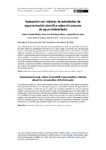Mostrar o rexistro simple do ítem
Evaluación mediante rúbricas de actividades de argumentación científica sobre el consumo de agua embotellada
| dc.contributor.author | Cebrián-Robles, Daniel | |
| dc.contributor.author | Rodríguez Mora, Francisco | |
| dc.contributor.author | Blanco-López, Ángel | |
| dc.date.accessioned | 2019-06-18T11:16:03Z | |
| dc.date.available | 2019-06-18T11:16:03Z | |
| dc.date.issued | 2019 | |
| dc.identifier.citation | Cebrián-Robles, D., Rodríguez-Mora, F., & Blanco-López, Ángel. (2019). Evaluación mediante rúbricas de actividades de argumentación científica sobre el consumo de agua embotellada. Ápice. Revista De Educación Científica, 3(1), 85-93. https://doi.org/10.17979/arec.2019.3.1.4623 | es_ES |
| dc.identifier.issn | 2531-016X | |
| dc.identifier.uri | http://hdl.handle.net/2183/23244 | |
| dc.description.abstract | [Resumen] Los contextos de la vida diaria refuerzan en los estudiantes el interés por aprender a la vez que permiten aplicar los aprendizajes fuera del aula. En este trabajo se presenta una propuesta para evaluar la capacidad de argumentación de los estudiantes mediante el uso de rúbricas. Las actividades de evaluación forman parte de un programa formativo cuya finalidad es transmitir ciertos valores y conocimientos sobre el consumo de agua embotellada, a la vez que trabajar la argumentación científica. En concreto, se muestra un esquema de análisis de la dificultad de las actividades de argumentación basándose en dos aspectos: el grado de familiarización de los estudiantes con el contenido científico implicado en cada una de ellas y la procedencia de las pruebas necesarias para construir un argumento científico. Finalmente, se plantea como hipótesis una progresión didáctica para mejorar la capacidad de argumentación científica a partir de los datos obtenidos con estudiantes de tercero de ESO. | es_ES |
| dc.description.abstract | [Abstract] The contexts of daily life reinforce the interest to learn in the students while allow to apply the learning outside the classroom. In this paper, a proposal is presented to evaluate the argumentation capacity of students through the use of rubrics. The evaluation activities are part of a training program whose purpose is to transmit certain values and knowledge about the consumption of bottled water, while working on scientific argumentation. Specifically, it shows a scheme of analysis of the difficulty of argumentation activities based on two aspects: the degree of familiarization of students with the scientific content involved in each of them and the origin of the evidence needed to build a scientific argument. Finally, a learning progression is proposed as a hypothesis to improve the capacity for scientific argumentation based on the data obtained with secondary students | es_ES |
| dc.language.iso | spa | es_ES |
| dc.publisher | Universidade da Coruña | es_ES |
| dc.relation.uri | https://doi.org/10.17979/arec.2019.3.1.4623 | es_ES |
| dc.rights | Atribución-CompartirIgual 4.0 España | es_ES |
| dc.rights.uri | http://creativecommons.org/licenses/by-sa/3.0/es/ | * |
| dc.subject | Argumentación | es_ES |
| dc.subject | Agua embotellada | es_ES |
| dc.subject | Problemas socio-científicos | es_ES |
| dc.subject | Pruebas científicas | es_ES |
| dc.subject | Evaluación | es_ES |
| dc.subject | Argumentation | es_ES |
| dc.subject | Bottled water | es_ES |
| dc.subject | Socio-scientific issues | es_ES |
| dc.subject | Scientific tests | es_ES |
| dc.subject | Evaluation | es_ES |
| dc.title | Evaluación mediante rúbricas de actividades de argumentación científica sobre el consumo de agua embotellada | es_ES |
| dc.title.alternative | Assessment through rubrics of scientific argumentation activities about the consumption of bottled water | es_ES |
| dc.type | info:eu-repo/semantics/article | es_ES |
| dc.rights.access | info:eu-repo/semantics/openAccess | es_ES |
| UDC.journalTitle | Ápice. Revista de Educación Científica | es_ES |
| UDC.volume | 3 | es_ES |
| UDC.issue | 1 | es_ES |
| UDC.startPage | 85 | es_ES |
| UDC.endPage | 93 | es_ES |






